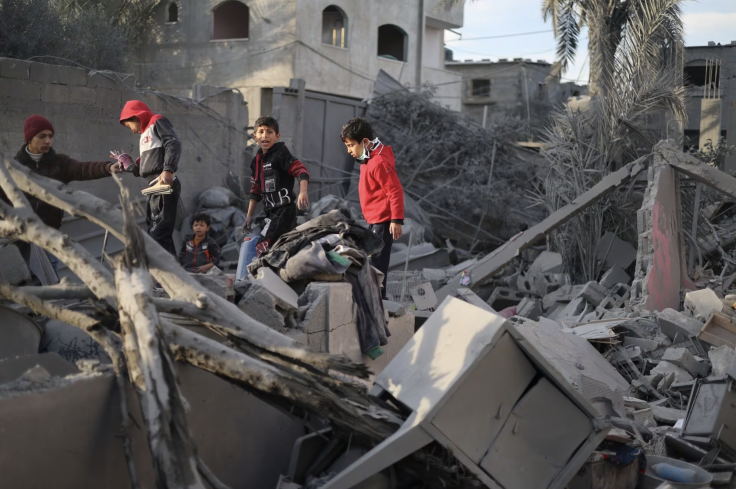IDF Launches Attack on Rafah Despite Allies' Warnings as EU criticises US military aid to Israel
The IDF attacked Rafah early Monday despite calls for restraint from allies as people in Gaza recounted a terrifying ordeal; 2 Israeli hostages were recovered.

In the early hours of Monday, Israel began a military onslaught on a designated safe zone it encouraged Palestinians in Gaza to speak of their terror at the sound of aerial bombardment and military helicopters as the Palestinian Ministry of Health reported a death toll so far from the attack of 67.
The attack comes despite exhortations from various world leaders and humanitarian organisations to desist bombardment on heavily crowded Rafah.
The IDF hit 14 houses and 3 mosques in various parts of the city.
The IDF said it had hit a number of "terror targets" in the Shaboura district of Rafah and that the strikes had ended.
Rafah is currently hosting 1.3 million Palestinians. Before Israel's military onslaught, Rafah's 64 square kilometre area was host to a population of 275,000.
Two Argentinian-Israeli hostages – Fernando Simon Marman, 60, and Louis Hare, 70 – have also been freed in an operation by Israeli Special Forces during the Rafah offensive to cover for which, Israel said it launched a "wave of attacks".
Israeli Prime Minister Benjamin Netanyahu quickly seized on the development to claim that military pressure should continue, in the process ignoring warnings by allies to halt attacks.
Netanyahu said in a statement: "Only continued military pressure, until complete victory, will result in the release of all our hostages."
It is unclear what Israel's objective is in attacking Rafah. Claims of "dismantling terrorist battalions" have not been furnished with any evidence thus far. The unsubstantiated rhetoric is reminiscent of previous unproven statements made by the IDF – such as those citing underground command centres of Palestinian armed factions.
Similarly, the IDF claimed military offensives in North Gaza had eliminated Palestinian fighters there, only to recant later.
On the other hand, The Palestinian Ministry of Foreign Affairs, in a statement released on X, said: "Israel is officially continuing to target civilians and transfer the war to Rafah to push the population to get displaced under bombardment."
Many observers fear that the IDF seems to be displacing Palestinians in Gaza into the Sinai Peninsula in Egypt. Egypt has built up a military presence on the border in response.
Palestinian Prime Minister Mohammad Shtayyeh has issued a strongly worded statement, saying that by "killing, destroying, and trying to displace Palestinian people in the Gaza Strip, Israel wants to reshape the demographic balance to its advantage, after it shifted in favour of Palestine, for the first time since 1948", according to the Wafa news agency.
Health officials are reporting that disease is flourishing in overcrowded conditions. Officials have reported an outbreak of Hepatitis A which transmits easily in close contact.
"There is nowhere left... to flee to," said Angelita Caredda, Middle East and North Africa director for the Norwegian Refugee Council.
Mounting International Concern
Whilst the US adopted a sterner tone saying Tel Aviv should "put civilians first and foremost", it did not follow through with any policy changes such as withholding aid or support.
On this point, the European Union policy chief, Josep Borrell, has just issued some critical remarks directed towards the US.
Recalling US President Joe Biden's remarks from last week in which he said that Israel's attack on Gaza had been "over the top", Borrell questioned: "Well, if you believe that too many people are being killed, maybe you should provide less arms in order to prevent so many people being killed."
UK Foreign Secretary, David Cameron has called on Israel to halt its military offensive in Rafah, and renewed calls for a sustainable ceasefire. The former Prime Minister said Israel should "stop and think very seriously before it takes any further action."
Saying the UK is "very concerned" about the situation, Cameron continued that "above all, what we want is an immediate pause in the fighting, and we want that pause to lead to a ceasefire."
Meanwhile, the UK has followed in the footsteps of the US, imposing sanctions on four "extremist Israeli setters" accused of committing human rights abuses against Palestinians in the occupied West Bank.
Whitehall stated that these individuals "threatened and perpetrated acts of aggression and violence" against Palestinians.
Settler attacks against Palestinians in the occupied West Bank have increased sharply since Israel launched its war on Gaza.
© Copyright IBTimes 2025. All rights reserved.





















